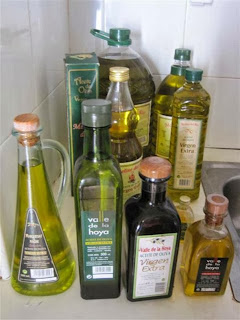When the smoking ban was introduced at the start of 2011, there were warnings as to its dire consequences for bars and restaurants. Though various figures were subsequently produced which indicated a slump in revenues, the widely feared mass closure never materialised. But there was a further fear associated with the ban, which was the character of bars would change. If this character was a change from smoke-filled rooms, then it was a change very much for the better.
There is now a further challenge to this character looming into view. It is not of the same magnitude as the smoking ban, it is not a change that has been paid a great deal of attention, but it is one which, nevertheless, has bar and restaurant owners complaining once more. From the start of 2014, the way in which olive oil is dispensed is to alter.
It is common to find, even in the humblest of bars, an oil and vinegar set. The culinary tradition is to pour the oil and vinegar simultaneously onto a salad or pour only the oil onto whatever might take one's fancy. Oil will still be available, but not in the dispensers which are currently used. As of January, olive oil will only be served in capsules or in small, non-refillable bottles from between 250 and 750 millilitres. What this will mean in practice is that the current table-top dispenser, which is refilled, will disappear along with other more exotic oil dispensers, such as those which have spices in tall, thin-tipped bottles.
Restaurant and bar owners fear that this change, and it is one enshrined in national government law, will increase their costs, and there is a fear also therefore that the cost will be passed onto the customer. Indeed, it is hard to see how it won't be. The chances are that there will be a small addition to the bill, one to cover the cost of olive oil which, if it is there at present, is hidden.
Why is the government introducing this law? It all comes down to quality and to preserving the good name of Spanish olive oil. It might not be well appreciated just how easily olive oil can go off; unlike wine, which is meant to improve with age, the opposite applies to olive oil, as it will become rancid. Expose it to light (and dispensers are usually clear glass), to the air and to high temperatures, and it will deteriorate. In fact, olive oil deteriorates almost from the time it is pressed. It is similar in some respects to fruit juice. It is best used immediately, but it does of course undergo any number of processes, not least storage and transport. By the time it actually gets to a shop or a bar, it has already lost some of its quality. But further loss can be prevented by adopting measures which don't bring it into contact with environmental factors; hence, the government's law.
There is, though, a knock-on environmental issue associated with this change. What is going to happen with all the containers with half-used oil? Is there not actually going to be a great deal of wasted oil? Possibly, though the point is being made that a container does not have to be used for only one customer; it could, depending on volume, serve several. This, though, is likely to represent one of the biggest cultural shifts in how oil is consumed in restaurants at present. Customers aren't used to being offered another customer's leftovers.
But where customers might not have been that alert to the idea that the oil they were consuming was undergoing a process of deterioration, they will be more aware now, even if one non-refillable container is used. This is because the government will be telling them that it is deteriorating. Labels are apparently due to state that there is a "loss of integrity after a single use", which may be all very well in terms of consumer information but doesn't sound like a completely ringing endorsement of the very change it is effecting.
There again, most Spanish customers will be aware that oil deteriorates. They do, after all, buy huge amounts of oil for domestic consumption. Regardless of how many times the oil bottle might be opened and the oil therefore exposed to the air, the oil doesn't typically go rancid; it gets used up pretty quickly because it is so much of a staple of the Spanish diet, both the "suave" version and the higher-grade, more flavoursome, more health-giving extra virgin oil.
The government believes that this law will be helpful for exports - and Spain is the world's leader in olive-oil export - as tourists will be assured that what they are consuming in restaurants is of the very finest quality and be so impressed that exports will increase. Perhaps the government is right to believe this, but its argument sounds pretty weak.
Whatever the arguments for and against, by the end of February at the latest, all establishments will be expected to have used up any existing stock, and so will not able to use it after then. Two months before this, on 1 January, the new law will come in, and the nature of the serving of olive oil in bars and restaurants will change forever.
Photo from http://www.photoblog.host-spain.com
Subscribe to:
Post Comments (Atom)





No comments:
Post a Comment